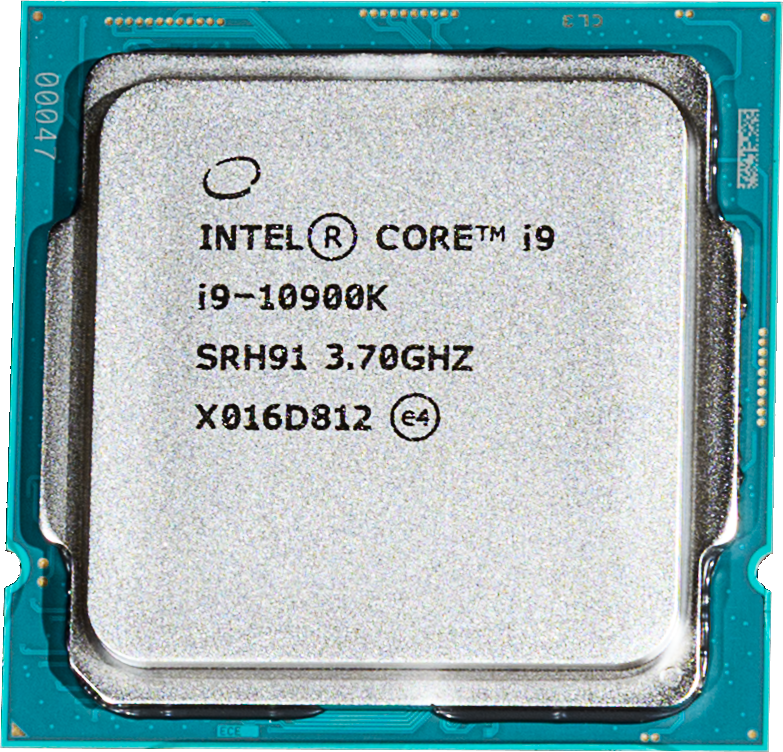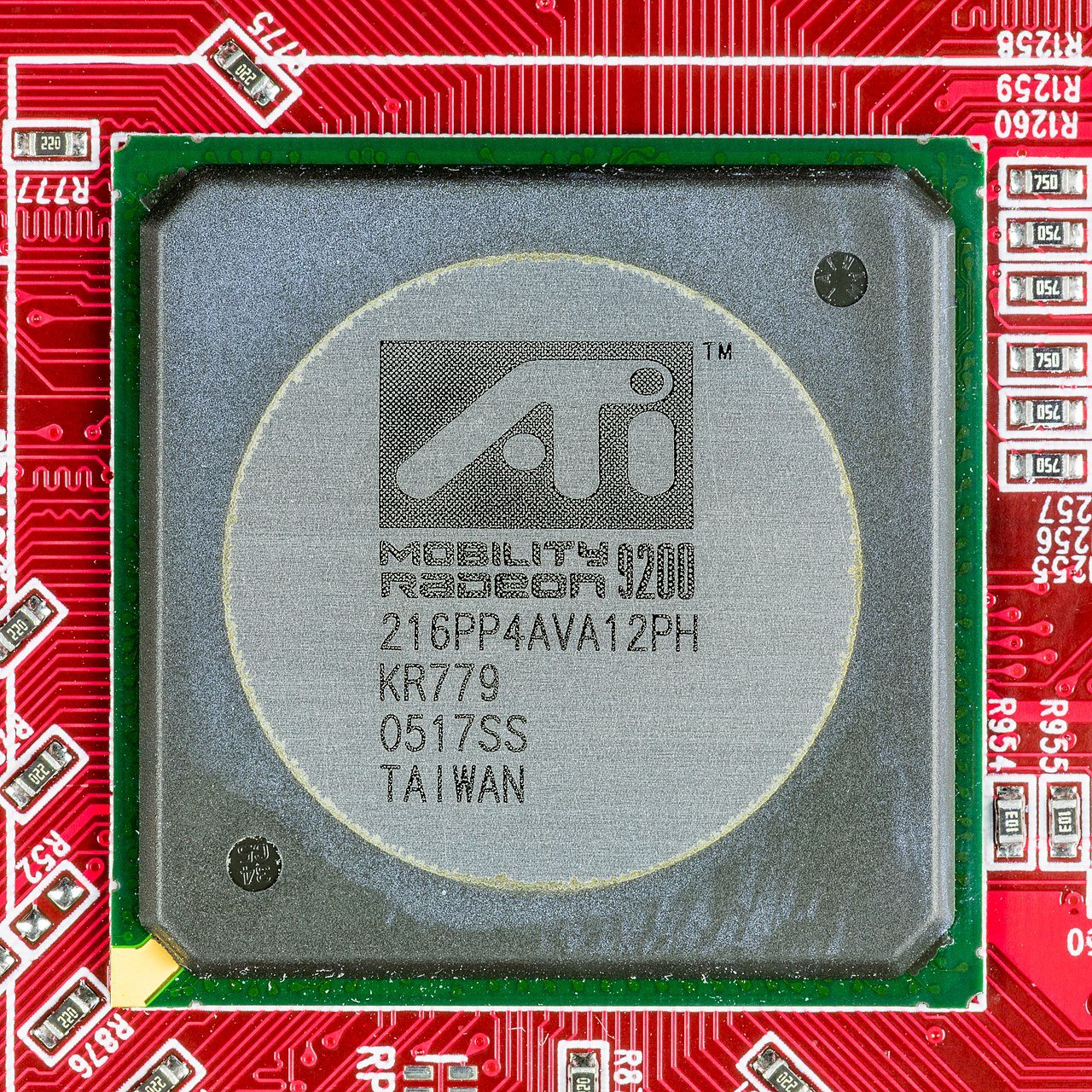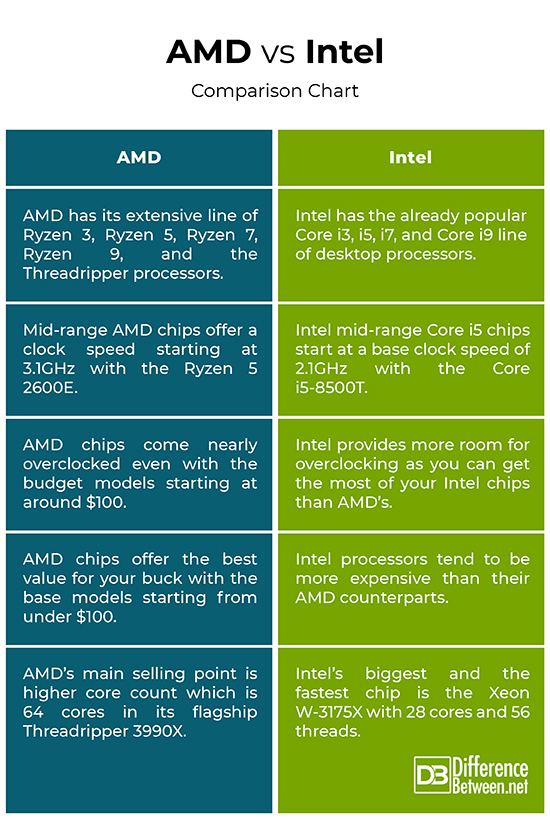Difference Between Benchmarks AMD and Intel
The biggest turning point in the long-raging processor war is undoubtedly the introduction of multicore processors from tech giants Intel and AMD. The Intel versus AMD rivalry is one of the greatest debates among PC enthusiasts and both have been fighting for the throne of semiconductor chips market for decades. And with the AMD’s latest addition, it challenges the Intel’s gaming dominance with its new Ryzen 5000 desktop CPUs, featuring the new Zen 3 architecture. Intel has long been the undisputed leader of the semiconductor chip market but AMD continues to regain its CPU footing with its budget offerings. AMD is still untouchable in the value department and probably the most preferred choice of processor in the gaming fraternity. But the choice between the two is still a difficult one, considering the competition has gotten fiercer now.

What is Intel?
For decades, Intel has been the undisputed leader of the semiconductor chips market and its success was clearly attributable to its relentless product innovation. Intel is at the very heart of the PC value chain and recently Intel introduced the much anticipated 11th Gen processors with Intel Iris X graphics, pushing the boundaries of mobile computing to new heights. With the 11th Gen lineup, Intel promises top-notch performance with unparalleled capabilities for everything, from gaming and entertainment to content creation and video rendering, and so much more.

What is an AMD?
The American semiconductor giant and Intel’s archrival AMD is the biggest competitor who has been giving a tough competition to its counterpart in the components arena for years. AMD has been on a crusade against the Intel’s stronghold in the computer chips market. AMD is doing great stuff and for years, it has been giving Intel a run for its money. AMD holds the higher ground offering unmatched performance with its new, powerful Threadripper processors, with the Ryzen 9 3900X being the most powerful beast in the AMD’s lineup. Recently, AMD announced the Ryzen 5000 processors with the next-generation Zen 3 architecture which it claims can beat the hell out of Intel on every count.
Difference between Benchmarks AMD and Intel
Desktop Processors
– Current multicore desktop processors from both AMD and Intel have some powerful offerings in the segment. AMD has its extensive line of Ryzen 3, Ryzen 5, Ryzen 7, Ryzen 9, and the ultimate Threadripper processors which are a class apart in itself, offering up to 16 cores out of the box. AMD delivers on its promise of unparalleled performance on a budget and with its latest Zen 3 architecture based Ryzen 5000 series desktop processors, it takes the game to a whole new level. Intel has the already popular Core i3, i5, i7, and Core i9 line of desktop processors. Intel’s 10-core Core i9-10900K closes the gap with AMD’s best processor and it claims to be the world’s best gaming CPU but the extra punch comes at a cost of high power consumption. AMD clearly beats the competition, offering more cores, more threads at every price point.
Laptop Processors
– The rivalry is not limited to the desktop ecosystem alone, as the war continues over the laptop market as well. With multicore processors available from both AMD and Intel, the choice between the two is not always straightforward because processor is just one of the many factors that impact your buying decision. That being said, the Intel’s latest 10th-generation mobile chips deliver remarkable performance and with the H-Series mobile ships break the 5GHz barrier, pushing the boundaries of single-threaded performance to give gamers more headroom and content creators the power they need to get going. AMD took a more streamlined approach with its new Ryzen 4000 mobile chips that promise unparalleled processing speeds complimented with game-ready graphics chips. The ROG Zephyrus G14 proves to be a heavy contender in the gaming race with its power-packed gaming performance in a small 14-inch form factor.
Overclocking
– AMD’s selling point has always been that you get the best value for your buck, but overclocking is a whole new game which does not always account for real world performance. Overclocking is pushing the potential to get maximum performance out of your CPU but the question is not whether you can overclock your CPU but if you should. The results greatly vary depending on your skills and the hardware. That being said, Intel provides a more headroom when it comes to overclocking meaning you can get the most out of the Intel chips than you can with AMD chips because AMD chips comes near-overcloked right out of the box. Intel chips are more aggressive capable of pushing the boundaries of your in-game performance exactly what you’d get from the high-end gaming CPUs.
Performance
– AMD is still hard to beat in the value department but if you’re looking for the best performance CPU in a budget, it gets a little bit tricky. May be there are other reasons than performance where you might want to choose either Intel or AMD over the other, but when it comes to straight performance, you can hold your thought. AMD’s latest chips offer more cores and threads at nearly every price point you can think of, but Intel chips deliver better gaming performance if you move out of the entry-level segment. AMD chips, particularly the Threadripper 3990X is a powerhouse of multicore performance whereas AMD barely holds the ground when it comes to single core performance. For graphics-heavy tasks such as gaming, photo and video editing, 3D modeling and rendering, AMD and Intel both perform exceptionally well. The Intel’s Core i9-10900K beats the AMD’s Ryzen 9 3900X a mile away in terms of gaming performance, but it costs a whopping $100 more.
AMD vs. Intel: Comparison Chart

Summary of AMD vs. Intel
For your everyday tasks such as web browsing, video streaming, checking out emails, photos and video editing, both AMD and Intel are more than capable of providing the best performance right out of the box. In a single-core performance, Intel beats the hell out of AMD but when it comes to multi-core performance, AMD holds the higher ground. So, if you’re looking to perform some graphics-heavy tasks such as video editing, 3D modeling and rendering, gaming, AMD’s processors are the best value for your buck, holding the ground throughout the budget and performance spectrum. Intel is without a doubt the undisputed king of the semiconductor chip market, but for Intel chips, you have to pay more for almost same level of performance you’d get from AMD’s chips.
- Difference Between Caucus and Primary - June 18, 2024
- Difference Between PPO and POS - May 30, 2024
- Difference Between RFID and NFC - May 28, 2024
Search DifferenceBetween.net :
Leave a Response
References :
[0]Alcorn, Paul. “AMD vs Intel 2020: Who Makes the Best CPUs?.” Tom's Hardware, Future US, Inc, 20 Sept. 2020, www.tomshardware.com/features/amd-vs-intel-cpus. Accessed 9 Oct. 2020.
[1]Martindale, Jon. “AMD vs. Intel.” Digital Trends, Designtechnica Corporation, 12 Aug. 2020, https://www.digitaltrends.com/computing/amd-vs-intel/. Accessed 9 Oct. 2020.
[2]“AMD vs Intel: Which CPU Should You Buy?.” HelloTech.com, HelloTech, 4 March 2020, https://www.hellotech.com/blog/amd-vs-intel-which-chip-should-you-buy. Accessed 9 Oct. 2020.
[3]Image credit: https://en.wikipedia.org/wiki/File:Intel_Core_i9-10900K.png
[4]Image credit: https://en.wikipedia.org/wiki/Radeon_9000_series#/media/File:ATI_Radeon_R9250_128MB_64Bit_-_ATI_Mobility_Radeon_9200_216PP4AVA12PH-5203.jpg
